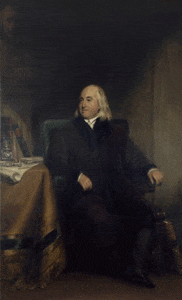Bentham, Utilitarianism and Sex
By Nick J Booth, on 5 February 2014
On February 14th (yes, Valentine’s day) I will be giving a short talk at ‘Late London: City of Seduction’, part of the Museum of London’s special events program, on the auto-icon of Jeremy Bentham. I will be introducing the auto-icon, discussing how it was made and talking about some of the legends that have built up around it (head used for a game of football anyone?). I will then relinquish the floor to Professor Philip Schofield, head of the Bentham Project, an expert of Bentham’s life and works.
So, a dead Philosopher, a mummified head and an articulated skeleton don’t sound very suitable for Valentine’s day do they? And maybe they aren’t, however if you look closer at the philosophy Bentham helped found…
Bentham is often referred to today as the father of Utilitarianism. This isn’t the place to discuss it in depth, there are plenty of other websites that do so much better than I could, however to briefly sum it up – the desired outcome of all actions should be the maximisation of pleasure and minimisation of suffering. So pleasure = good, suffering = bad.
So far so common-sense. However Bentham, working from this philosophy, came up with some pretty modern-sounding ideas. These include supporting suffrage for women, calling for animal rights and the abolition of slavery. It also led him to advocate for gay rights, at a time when being homosexual in Great Britain could result in the death penalty.
Bentham believed that things that gave pleasure were good. Sex gave pleasure, there for it was good – as long as it was consensual and no-one got hurt. So as something good sex should not be reserved for a man and a woman in marriage, it should be open to all – same sex, different sex, multiple partners.
Professor Schofield summed it up rather succinctly – “Sex is the purest and most intense form of pleasure: hence, sexual liberty.”
So, if you would like to hear more on Bentham’s auto-icon and his thoughts on sex, or take part in any of the other fantastic events (including absinthe tasting, life drawing and a special viewing of some rather risqué tiles) please do came along. Tickets are £10 in advance (with concessions), doors at 7pm and ends at 10pm. For more information you can visit the Museum of London website.
Nick Booth is one of the Curators of the Teaching and Research Collections at UCL.
 Close
Close



